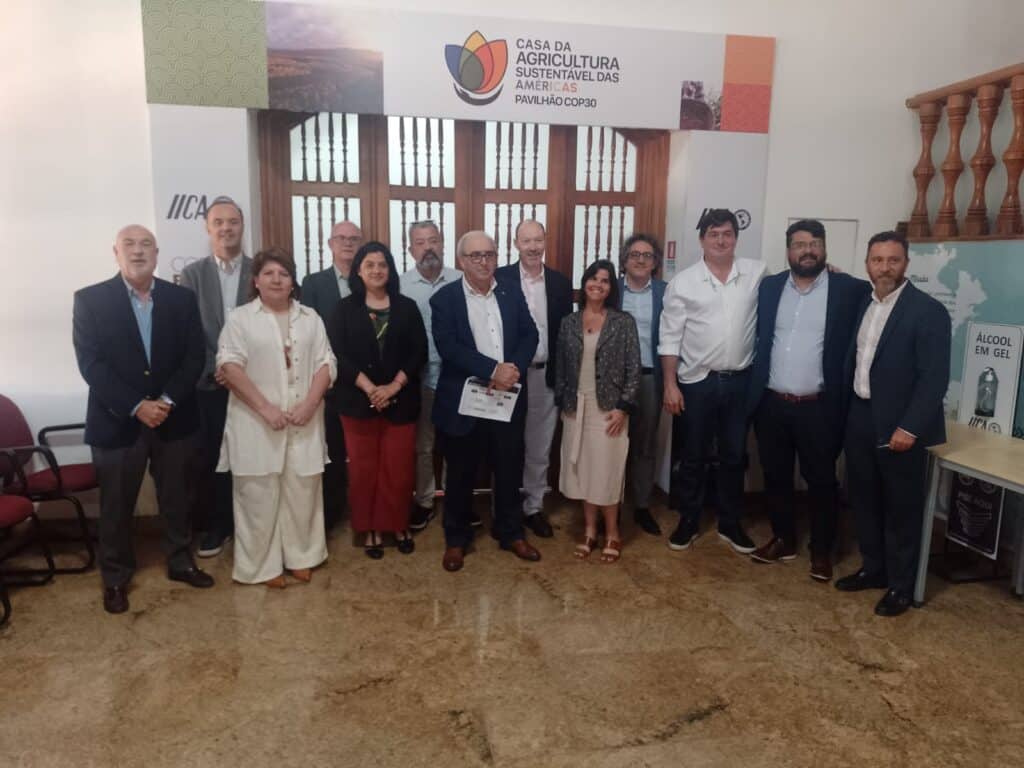
Brasilia, 27 November 2025 (IICA). The Southern Cone countries are working on a proposed type of risk insurance that would offer farmers protection against climate events that affect agricultural productivity and impact their livelihoods.
The project, which is being developed with the World Bank , was discussed in Brasilia by representatives of Argentina, Brazil, Bolivia, Chile, Paraguay, and Uruguay. These nations are all members of the Southern Agricultural Council (CAS), a regional integration forum whose technical coordinator is the Inter-American Institute for Cooperation on Agriculture (IICA).
Uruguay’s Minister of Livestock, Agriculture and Fisheries, Luis Alfredo Fratti, also took part in the discussions on the details of the insurance, which was the main item on the agenda of a meeting of the Agricultural Policy Coordination Network (REDPA), made up of the agricultural policy directors and technical teams of the ministries of agriculture of the six CAS countries.
At the IICA office in Brasilia, progress was made with the details of the design and implementation of agricultural risk insurance in the Southern Cone, taking advantage of the presence in the city of the delegations of the countries that took part in the Conference of Ministers of Agriculture of the Americas 2025, organized by the Brazilian government and IICA.
Simulations of the insurance scheme are already being carried out, using the agricultural losses caused by droughts in Brazil and Uruguay for the study.
Under the proposal, which is being studied with insurers, market analysts, and legal experts specializing in international agreements, risk insurance would be available for events with a 1 in 20 probability of occurring. The insurance would be managed in each country by the ministries of agriculture, which are responsible for supporting affected producers.
Public policies and productivity
Also presented at the meeting was a set of studies from the Inter-American Development Bank (IDB) showing that agricultural productivity in the Latin American and the Caribbean region grew by nearly 40 per cent between 2000 and 2015, but has experienced a slowdown since then.
Paolo de Salvo, Lead Rural Development Specialist at the IDB, summarized the main results of the research, which focused on the relationship between public policies and productivity.
The analysis highlights the fact that over the past 50 years, the growth of agricultural production in Latin America and the Caribbean has been above the global average, driven primarily by increases in productivity (achieved through greater efficiency and the adoption of new technologies). The recent slowdown raises numerous challenges and questions.
It notes that policies that distort prices have a negative impact on agricultural productivity, while direct subsidies and public investment in research and development have a positive impact.
“In the region, public spending on agriculture accounts for only five percent of agricultural GDP. Most countries in Latin America and the Caribbean invest less than one percent of their agricultural GDP in research and development “, Di Salvo explained.
The recommendations include reducing price distortions that generate negative effects on productivity; focusing support on direct incentives that improve productivity and facilitate adaptation and resilience; and reinforcing and giving continuity to investments in agricultural public goods such as research, innovation, health and infrastructure that increase productivity over the long term.
The REDPA team also addressed a set of priority issues for the entire regional, such as the current status of Regulation (EU) 2023/1115, the Mercosur-European Union agreement, and the drafting of a technical cooperation project by the CAS countries to deal with the problem of the fruit fly.
The actions of REDPA’s six technical groups in 2025 were also reviewed. Particular attention was paid to the progress made by the Working Group on Public Policy and Climate Change, which is focused on improving methodologies for measuring carbon emissions and removal in agriculture, a task being funded by the IDB. The goal is to create a roadmap for a regional strategy on methodological improvements for measuring emissions and removal.
In addition to Minister Fratti, the meeting was attended by Verónica Durán, Director of the Agricultural Programming and Policy Office (OPYPA) at Uruguay’s Ministry of Livestock, Agriculture and Fisheries (MGAP); Gerardo Petri, Director of Multilateral Negotiations at Argentina’s Secretariat of Agriculture, Livestock and Fisheries (SAGyP); Andrea García, Director of Chile’s Office of Agricultural Studies and Policies (ODEPA); Liliana Miranda, Director of Planning at Paraguay’s Ministry of Agriculture and Livestock (MAG); Paulo Marcio, International Relations Specialist at Brazil’s Ministry of Agriculture, Livestock and Food Supply (MAPA); Javier Dufourquet, Agricultural Attaché at Argentina’s Embassy in Brasilia; and Gabriel Delgado, Technical Secretary of the CAS and IICA Representative in Brazil.
More information:
Institutional Communication Division.
comunicacion.institucional@iica.int











